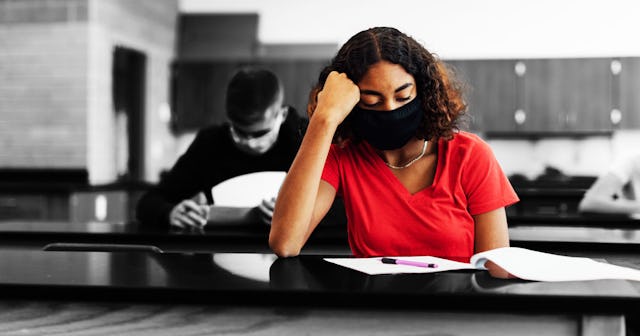Kids Are Facing Increased School Anxiety This Year––What To Do About It

As parents, we are always anxious when a new school year begins. We hope that our children are ready for school both physically and mentally, but sometimes we have doubts and question how prepared they are. It is natural to have these concerns because we only want the best for our children. But we are not the only ones who experience this type of anxiety. Our kids have concerns too, which are compounded this year by COVID.
In a normal year, a child would likely be anxious about having their friends in their class and whether or not they will like their teacher. Moving into a new school can also be intimidating. But as we all know, this is not a normal year.
It is hard to keep our children away from the news and the scary things that are happening in our world. They know what is going on and they are afraid. They are likely, and hopefully, returning to school masked and with social distancing protocols in place. For those who have been in virtual learning settings for the better part of a year and a half, things will look very different. That can be frightening for kids.
Scary Mommy talked with Dr. Heidi Sallee, SLUCare Pediatrician at Cardinal Glennon Children’s Hospital in St. Louis. She said that anxiety is particularly high for children this year.
“For kids who did not attend in-person school last year, they may be worried about what in-person school will be like and how they will interact with kids or teachers again. Some kids who did not do well with virtual learning may worry about the workload if they are not caught up with the rest of the class. Kids may worry about what it will be like to wear a mask all day,” she said.
Kids are not used to their desks being far apart. They like to see their friends’ faces and to hear them speak clearly. No one likes to have partitions between the seats in the cafeteria, but these things are the norm today. Think about how that would have made you feel as a kid; probably pretty fearful and anxious. Not only is a new school year a bit intimidating, you are entering a world at school that can be downright frightening.
It is always the fear of the unknown that creates anxiety in all of us. Kids are feeling isolated from their friends and their normal routines. This, among other things, has caused increased anxiety in kids, particularly adolescents. Sallee said that things are especially tense for kids today because they are seeing adults in their lives fearful of what is happening in our world. The inundation of rhetoric from social media also isn’t helping. It is a perfect storm for the anxious.
As parents, we want to help to relieve our children’s anxiety. Sallee gave the following tips to aid in calming our kids.
Halfpoint Images/Getty
Encourage a good night’s sleep.
Eight hours is a reasonable goal and can be achieved by turning off the electronics at least an hour before bedtime. Even though it can be tempting, do not stray far from the usual schedule during the weekend. Staying in a good routine will keep your child stay rested, which promotes their overall well-being.
Reconnect through family time.
Aim to have dinner as a family as often as possible. Three to four times a week is ideal. This gives the family a great opportunity to reconnect and discuss what is happening in each of their lives. Make sure to shut down all electronics for at least 15-20 minutes so everyone has a time to reconnect.
Don’t hesitate to contact your child’s doctor.
When anxiety begins to creep into daily routines and activities and is causing an interruption, contact your pediatrician. Early treatment is best.
Acknowledge and validate children’s feelings.
She added that it is important that we acknowledge our children’s feelings and to validate them. Their thoughts are important and we need to recognize that. This is done by providing unconditional love and teaching them coping skills. Sometimes it is important to reach out to a professional to aid in learning these skills, and that is OK.
“They certainly might worry about getting sick, or bringing home covid to vulnerable family members. They may worry that if they get sick, they will make a classmate sick. If they have heard bad things about wearing masks, they may worry that masks will hurt them in some way. The list of potential worries is long, depending on what they have heard from people around them,” she said.
Salle reminds us that creating a positive, but honest environment for our children is key in reducing their anxiety. We want them to be armed with the truth, not fear. Be supportive of mask policies and restrictions. Remind your children that it is important for them to protect themselves and to be conscious of others. The best way to do this is to mask up and get vaccinated if you are over 12. And remember to always talk to your pediatrician if you have concerns.
This article was originally published on